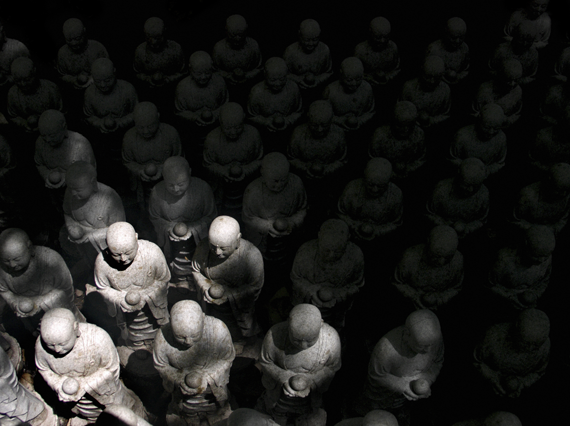The influence of Zen Master Ikkyu (1394–1481) permeates the full field of medieval Japanese aesthetics. Though best known as a poet, he was central to the shaping and reshaping of practices in calligraphy, Noh theater, tea ceremony, and rock gardening, all of which now define Japan’s sense of its cultural tradition.
Ikkyu is unique in Zen for letting his love of all appearance occupy him until it destroys any possibility for safety or seclusion. In his poetry, he turns the eye of enlightenment to all phenomena: politics, pine trees, hard meditation practice, sex, wine. The poems express the unborn bliss of his realization and equally his devastation at the horrors of this world. From this union of bliss and heartbreak he rails without hatred against hypocrisy, corruption, and bad religion, he consorts free of lust with prostitutes and musicians. His awakening outshines the small idols of reason, emotion, self, desire, doctrine, even of Buddhism itself.
—Sarah Messer and Kidder Smith, translators
Enlightenment
Ten years ago I couldn’t stop thinking, feeling,
Just anger, just rage, until this moment.
A crow laughs, the dust clears, I hold the arhat’s fruit.
Spotted sunlight in Zhaoyang Palace, a pale face chanting.
Poem #144: Ode to the Brothel
Beautiful woman, cloud and rain, love’s deep river.
Old Zen Pavilion Monk, up in the pavilion singing.
I have such refined passion for hugging and kissing.
My mind doesn’t say: the world is a fire, give up your body.
I Hate Incense
Who can even discuss a master’s methods?
Speaking of Dao, talking of Zen, your tongues grow long.
Old Ikkyu abhors your scrambling after marvels.
I make a pinched, sour face, all this incense thrown on the
Buddha.
Poem #104
True transmission side-steps delusive combat.
Vast kalpas of unenlightenment are made of the feelings
“self” and “other.”
Carrying self and other makes the balance pole heavy.
When emptiness looks at a butterfly, the whole body becomes
light.
Poem #108
Downwind, pine and cedar recklessly enter the clouds.
Everywhere stir the multitude and alarm the crowd.
I can’t do the tricks of “person” and “environment.”
One cup of murky dregs gets me drunk drunk.
Poem #543: Written Out of Desire to Thank Lady Mori for Her Profound Blessing
The tree withers, leaves fall. Spring returns again.
The long green stems give birth to flowers, old vows are
renewed.
Ah Mori, your profound blessings. If I forget and turn away,
For a million measureless kalpas I’ll be born again and again
as an animal.
♦
From Having Once Paused, by Zen Master Ikkyū, translated by Sarah Messer and Kidder Smith. University of Michigan Press. Copyright © by Sarah Messer and Kidder Smith, 2015.
Thank you for subscribing to Tricycle! As a nonprofit, we depend on readers like you to keep Buddhist teachings and practices widely available.
